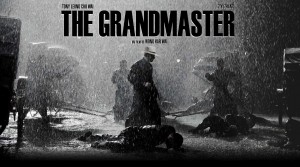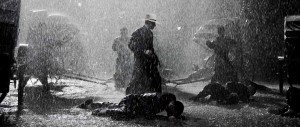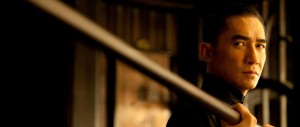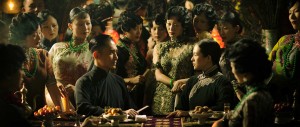Cast: Tony Leung Chiu-wai, Zhang Ziyi, Zhang Jin, Chang Chen, Song Hye-kyo, Wang Qingxiang, Yuen Woo-ping
Cert: TBC
Running time: 125mins
Year: 2012

The lowdown: After a 6-year absence maverick Hong Kong director Wong Kar-wai returns to the big screen with a biopic of martial arts master Ip-Man. Tony Leung Chiu-wai is the stoic kung-fu legend, whose turbulent life included rivalry with competing schools; oppression from occupying Japanese forces and the subsequent Communist Chinese government, and who late in life mentored a young Bruce Lee. House of Flying Daggers star Zhang Ziyi mesmerises as a vengeance seeking martial arts virtuoso drawn to Ip, while four action choreographers, including the great Yuen Woo-ping, provide breathtaking set-pieces between the Wong trademarks of unrequited love, constrictive social boundaries and the all-conquering passage of time.
The full verdict: Wong Kar-wai has already directed one of Hong Kong’s finest martial art epics with Ashes of Time and arguably delivered cinema’s best romantic meditation with In The Mood For Love.
The Grandmaster promises to be a fusion of both, but while too accomplished to be considered a letdown does not reach the heights set by his two earlier films.
Ip-Man’s life story has been covered in two Donnie Yen movies (2008’s Ip-Man and 2010’s Ip-Man 2) that started an Ip-Man bandwagon, meaning The Grandmaster arrives relatively late to the party.
5-years in the making after a reported 16 year negotiation for Ip-Man’s life rights, this however should be the definitive account of the master’s life.
Covering the same time span as Yen’s two Ip-Man movies, it moves from the 1930s and Ip’s comfortable life dedicated to martial study, through the tragic invasion by Japanese forces and exile in Hong Kong, to the 1950s and the lead characters reflecting on what they have lost.
Yet, the film never fully brings its subject into focus, losing him amid an expansive cast, not all of whom are necessary.
One martial arts master, Razor (Chang), has a background so opaque (he could be a spy for Sun Yat-sen’s resistance or a violent loner) that save an exhilarating street-fight against government agents his loss would not be felt.
Elsewhere, Ip’s wife (Korean actress Song) is largely ignored and the tragedy that befell his family during the occupation similarly receives small screen time.
What interests director Wong more than Ip-Man himself is the last hurrah of kung-fu glory, before the horrors of World War II and Communism largely destroyed notions of chivalry.
A dense opening details the passing of power from aged master Gong Yutian (Wang) to new exponents in the North and South of China. The North is represented by the brilliant but tempestuous Ma San (Zhang Jin). Ip-Man is nominated for the South but must prove himself in a variety of contests, climaxing in a battle of wits with Gong, and a duel with his daughter, Er (Zhang Ziyi), that begins a doomed, long distance love affair.
Devoting equal time to the philosophical aspects of various martial arts as the physical risks casual viewers scratching their heads, but The Grandmaster is to be congratulated for emphasising the head as well as the fist.
The cast have clearly dedicated hundreds of hours to appear experts in their styles, with Ip-Man’s Wing Chun (a close quarter fighting style) getting Rolls-Royce treatment in the numerous fight scenes.
Yet, Ip is frequently reduced to supporting player in his own life story, a large chunk of the second half devoted to Gong-Er’s hunt for Ma San following a grievous wrong, culminating in a train station showdown that is the film’s action highpoint.
The instantly likable and frequent Wong collaborator Leung possesses the requisite benevolent stoicism to portray Ip, but Zhang’s is the knockout performance, burning with intensity as Er sacrifices everything to operate in a very male world.
Mounted on an epic scale, with full scale replicas of 1930s streets and opulent “gentlemen’s clubs” including The Golden Pavilion, The Grandmaster recalls the great heyday of Shaw Brothers and Golden Harvest movies.
And being a Wong Kar-wai film, despite the fists and fury this is ultimately an elegy to a world long gone, even quoting Morricone’s score to Once Upon A Time In America, another film about people conquered by circumstance.
Not the masterpiece hoped for then, but a film to revisit for further hidden treasures and, following 2007’s misstep My Blueberry Nights, a welcome return of a major filmmaker.
Rob Daniel
[youtube id=”BO1yfTfozhk”]









